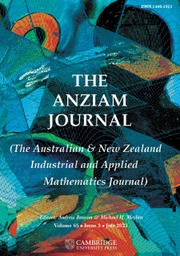Article contents
A notion of local proper efficiency in the Borwein sense in vector optimisation
Published online by Cambridge University Press: 17 February 2009
Abstract
In this paper we define two types of proper efficient solutions in the Borwein sense for vector optimisation problems and we compare them with the notions of local Borwein, Ishizuka-Tuan, Kuhn-Tucker and strict efficiency. A sufficient condition for a proper solution is also proved.
- Type
- Research Article
- Information
- Copyright
- Copyright © Australian Mathematical Society 2003
References
- 6
- Cited by




